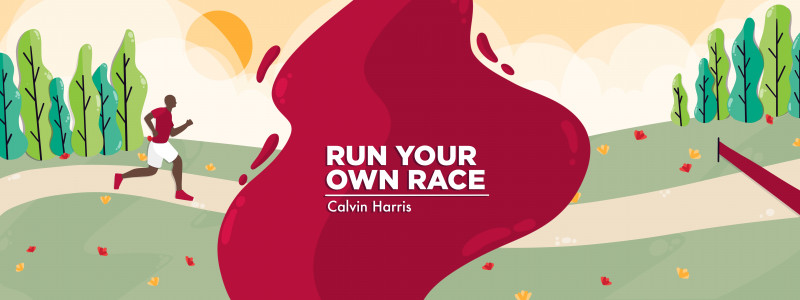Asking ‘What If?’ Can Be Worse Than Failure
Written by |

“Well, listen to your lungs.”
Those were the first words from my doctor’s mouth, following his slight look of concern.
It was early 2020, just before the COVID-19 pandemic began in the United States, and I had boldly (and perhaps foolishly) told him that I was running a half-marathon in May.
Had I run a half-marathon before? No.
Had I run 10 miles before? No.
Had I run 5 miles before? No.
Had I even run 1 mile before? Well, maybe.
Would the sarcoidosis in my lungs make running a major challenge? Definitely.
Recommended Reading
My specialist from the Johns Hopkins Sarcoidosis Clinic was naturally concerned, even though I had embraced a healthier lifestyle since my diagnosis in 2014, and increased my activity levels since my move to New York City in 2019.
Sarcoidosis would make running a big challenge. Sometimes it makes walking a challenge. And I did not have any history of running to lean on. At best, I was a novice. But I was determined to give it a try.
Much like my move to New York, an amazing opportunity had presented itself, and I knew that if I didn’t try it, I would always wonder, “What if?” I was ready to succeed, but could also live with failure. To me, wondering about the possibilities of success or failure is far worse than the actual success or failure itself.
“What if?” is a terrible question to have stuck in my head.
My move to New York City also coincided with my frequent visits to Peloton studios in Manhattan, where I rode on spin bikes and ran on treadmills. The treadmill work, especially with instructor Jess Sims, stoked a newfound love of running. Many of my studio classmates were great runners, and while I definitely was not, their energy fueled my energy — and my curiosity about the possibilities of a half-marathon.
Was it possible for someone with no real running experience to run a half-marathon, especially when sarcoidosis has compromised his lungs?
I had no idea, but I really wanted to find out.
Thankfully, my doctor didn’t say no, despite her reasonable concerns. Essentially, we agreed that I was OK to run, as long as I consistently “listened to my lungs.” In the end, I was thankful for her clearance, especially when the pandemic first began. Outdoor running was one of the few exercises that I could do during the COVID-19 pandemic.
While I am a slow runner, and it can be quite tiring, running makes me feel alive. It is one of the ways I tell sarcoidosis, “You may think you have me, but you’re not going to stop me today.” I almost feel like I don’t have this disease, if only for a little while.
Later that spring, after the 2020 Popular Brooklyn Half was changed to a virtual race, I proudly finished my first half-marathon, right on the Brooklyn Bridge. My lungs held up, even after my legs felt heavy and tired.
Now, I have had sarcoidosis long enough to know that my experience is not the norm. I cannot explain why my lungs are so scarred, yet I can still push through a run. My 10-minute mile pace isn’t setting any records, but it is quite respectable for someone with my health profile. Even if my pace wasn’t respectable, I wouldn’t care in the least.
I run my own race, and accept whatever my body can give me on a particular day.
Last weekend, I ran the Harlem 5K race (just over 3 miles). It was very humid, and much to my surprise, Harlem has a few big hills. But I was proud to finish the race. More often than not, I find that if I focus, I can run nonstop.
For those of us with sarcoidosis, this is our fight and our race to run. But sometimes, in addition to providing the medical expertise that we need, having the right doctor can make all the difference. Fortunately, there are many resources for those who want to stay active, including this column from my fellow Sarcoidosis News columnist Kate Spencer.
Sarcoidosis often makes common activities impossible, but sometimes we can make the impossible common. And I have my doctor to thank for encouraging me to push myself, and not telling me that my goals were impossible.
I’m so glad I didn’t have to wonder, “What if?”
***
Note: Sarcoidosis News is strictly a news and information website about the disease. It does not provide medical advice, diagnosis, or treatment. This content is not intended to be a substitute for professional medical advice, diagnosis, or treatment. Always seek the advice of your physician or other qualified health provider with any questions you may have regarding a medical condition. Never disregard professional medical advice or delay in seeking it because of something you have read on this website. The opinions expressed in this column are not those of Sarcoidosis News or its parent company, Bionews, and are intended to spark discussion about issues pertaining to sarcoidosis.






Ladis Gray
my doctor say to me ,I need transplant because my sarcoid is stages 4 Im believe i will be dead in the next 10 years.im stay home and doinhg the best to my ability.and pray to God.,,,thanks..
Dan C
I enjoyed your article. I have 20 years with this disease and my lungs look like a cotton candy machine from a local fair. Still, not unlike you, I have led a optimal life with the disease. We are competitors and try to beat the crap out of sarcoidosis every day.
I love that you are running because it is a sport that you can regulate. As a famous leader once said, if you can’t run, walk……..
D.A.S.
I run too and look forward to sustaining double digit miles again someday. Thanks for your example; gives me hope that I'm not chasing windmills.
Sheila Harris-Reyes
Nephew, you are an inspiration to all of us. Thank you very much for all of your experience and insights.